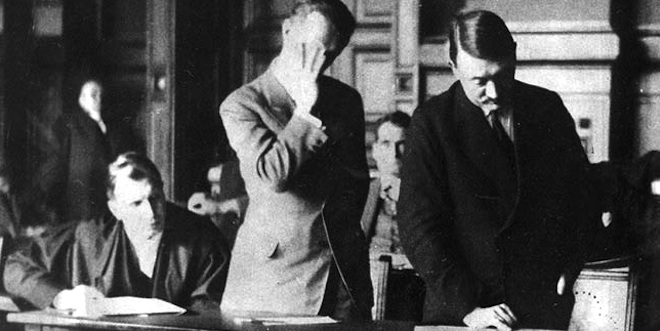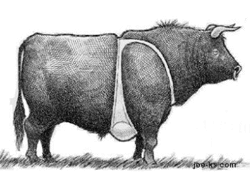A lustrous place in the sun
 Leverhulme •
Leverhulme •  Tuesday, May 15, 2012
Tuesday, May 15, 2012 The "rule of law" drum is repeatedly beaten as a way of reinforcing the great importance of lawyers and judges ... Yet, if the going got tough would lawyers, at risk to themselves, really stand-up for the rule of law? ... Or would they look the other way if faced with tyranny? ... Tulkinghorn provides an answer
 Hitler in court, 1931: Most lawyers ran and hid
Hitler in court, 1931: Most lawyers ran and hid
US Federal Appeals Court judge Richard Posner at the beginning of chapter 1 of his book Overcoming Law, says:
"The history of the legal profession is to a great extent, and despite noisy and incessant protestation and apologetics, the history of efforts by all branches of the profession, including the professoriat and the judiciary, to secure a lustrous place in the financial and social-status sun."
To secure this lustrous place, the legal profession must convince potential punters that what lawyers do is useful and of considerable value.
Clients must never suspect (to adopt a somewhat coarse rural saying) that most legal services are as useful as t*ts on a bull.
 Dissembling requiredThis calls for immense amounts of professional dissembling.
Dissembling requiredThis calls for immense amounts of professional dissembling.
Worse, a majority of the general public probably believes that not only are lawyers benignly useless, but that things would improve if we didn't have them at all.
(See: World without lawyers.)
Last year the UK Mail Online referred to Shakepeare's famous line about lawyers:
"In Henry VI (Part 2), Act 4, Dick the Butcher tells his fellow rebels: 'First thing we do, let's kill all the lawyers.'
There's been much debate as to whether this is a back-handed compliment to the legal profession, since the rule of law is seen as a barrier to bloody revolution. Whatever Shakespeare's intention, the quotation is reported to have been greeted with cheers and laughter by the audience when it was first performed. Lawyers were no more popular then than they are now."
The argument that Dick the Butcher was effectively praising lawyers has been described as a ...
"marvel of sophistry, twisting of the meaning of words in unfamiliar source, disregard of the evident intent of the original author and ad hominem attack. Whoever first came up with this interpretation surely must have been a lawyer."
Or a judge.
In 2006 Margaret McMurdo, the President of the Queensland Court of Appeal, observed:
"Dick the Butcher in Henry VI said: 'The first thing we do, let's kill all the lawyers.' My response to Dick is: 'Only if you want to kill democracy'."
Over the last few decades the profession has been grooming the concept of the "rule of law" to take on a bigger role – forming the basis of the legal profession's claim to its place in that lustrous sun.
Outfits like the Rule of Law Institute of Australia, founded in 2009, bear witness to this. Former NSW Chief Justice Spigelman is patron of RoLIA.
In this interview he refers to the increasing attention being directed to the "rule of law" over the last two decades.
Spigelman was asked this question during the interview:
"Is it right to say that the rule of law and its principles of fairness, rationality, predictability, consistency, and impartiality were principles that fitted within your desire to help bring about a fairer and more equitable society?"
Spiggsie wisely refrained from just saying, "Yes".
The English speaking world's legal professions never reduces its "rule of law" propaganda to the most obvious proposition: that lawyers and judges have historically fought for the rights of citizens in the face of great risk to their own personal safety.
This, if true, would justify their place in the lustrous sun - yet it is remarkable how few English lawyers have stood beside their clients on the scaffold, backing them to the bitter end.
My research indicates a total of zero, after weeding out those lawyers whose true agenda was political or religious.
According to the Manly Daily, Geoffrey Robertson's book The Statute of Liberty ...
"presents us with a fascinating quick guide down the centuries on the history of law and civil rights in Britain and Australia. He cites many examples where our rights have been protected by the judiciary of the day from tyrannical monarchs and parliaments."
At real personal risk to themselves? I can't find any of the "many examples" in that book.
Robertson's book The Tyrannicide Brief is full of praise for John Cooke, the lawyer who prosecuted King Charles 1.
Here was a lawyer who was prepared to take on a dangerous case (because the English monarchy might get reinstated). But, according to Michael Kirby, who reviewed book:
"Geoffrey Robertson portrays this as the first case of a barrister acting for clients, whatever his private beliefs or wishes. This is a dubious claim. For Cooke this was a famous brief. The parliamentary forces were dominant. The prospects of royal restoration were tiny. The risks were tolerably small. And God had told him to do the job."
The Robertson v Kirby disagreement runs deeper. According to Robertson, in the preface to this book:
"My own interest in Cooke began by chance, when I was invited to Gray's Inn to dispute a paper delivered by Mr Justice Kirby on the 350th anniversary of the trial of Charles 1. I accepted only because of a long-standing friend-ship with Michael, whose paper concluded that the trial was 'by legal standards a discreditable affair'. This seemed indisputable, until I dug out a very old edition of the State Trials ... To my surprise I found this trial to be far from discreditable - on the contrary it appeared for its time as an oasis of justice and fairness."
Robertson's book explains, for example, how the King was using his cane to poke the prosecutor (Cooke) -repeatedly. Even these days a defendant would not get away with that.
Moving on to Cooke's trial 11 years later, Robertson says:
"If ever a trial was a 'discreditable affair', his was it. The defendants had been locked up for months in plague-infected prisons, and were brought to the Old Bailey in shackles and leg-irons to be viciously mocked and abused by the partisan judges of Charles II, who instructed vetted jurors to convict without bothering to leave the jury-box."
The Cooke saga is some evidence for the proposition that one is more likely to get a fair trial under a republican set up, than under a monarchy.
Kirby's review of The Tyrannicide Brief does not explore this, nor does it clearly acknowledge that Kirby got things wrong in the first place.
Kirby, incidentally, is a monarchist.
Through English and Australian history, it is not the judges who have been bravely fighting against misuse of executive power at real risk to themselves.
It has been the "people", often in the form of juries, with judges even locking them up and denying them food until they did what the Establishment wanted.
Judges who tackle the mafia or terrorist organisations, admittedly, are brave indeed. More often than not, though, lawyers and judges are only too willing to sign-up and serve under totalitarian regimes.
While common law judges and lawyers are trying to create a history of brave defiance of executive power in order to protect the citizenry, we actually find that some of the bravest lawyers of the lot were various Jewish lawyers in Nazi Germany.
A good introduction can be found here.
At page 44 of J.R. Maxeiner's book The Rule of Law in Comparative Perspective it says that a Jewish lawyer Bendix ...
"was such a believer in legal certainty that, upon his release in May 1937 from the Nazi concentration camp at Dachau, he began to prepare a lawsuit against the camp's commandant. He surely would have brought the suit had his children not first hustled him out of the country to the safety of realist America."
Hans Litten is known as the lawyer who cross-examined Hitler (and paid for it with his life). A fascinating BBC docudrama on the Eden Dance Palace trial is referred to here.
Litten was trying to establish by means of his cross-examination that the Brownshirts were encouraged by their leaders to act contrary to the law.
Three men had been wounded by the SA, Budzinski, Braun and Kohler. They retained Litten to bring a private prosecution, which was run alongside the state prosecutor's case against alleged murderers involved in the attack on the Eden Dance Palace.
Hitler was pressed on his response to violent exortations issued by Goebbels. The Nazi leader said that Goebbels had been misunderstood and taken out of context.
The judge in the case started off letting Litten have free rein, but steadily changed horses as the questioning continued. In one scene, Litten's colleague Rudolf Oldern, who was watching the Eden Palace trial, says:
"He's gone, hasn't he? ... The judge ... Got one eye on writing his job application for if Hitler ever gets into power. Don't help him write it [Oldern says to Litten] ... you'll get no help now [from the judge] ... You're on your own."
No one can say whether our judges would do that too, when confronting such a terrible regime, but I suspect ours would not behave any better, despite all the rhetoric about judges supporting the "rule of law".
A letter written by Shane Budden in April to the Courier Mail this year notes:
"Few people know the name Hans Litten, although perhaps everyone should - and lawyers should revere him."
But, he goes on to treat as fact the pro-lawyer version of Shakepeare's "kill all the lawyers" from Dick the Butcher:
" 'The first thing we do, let's kill all the lawyers' is one of Shakespeare's most well-known and most frequently misunderstood quotes. Rather than being an indictment on the legal profession, the line describes the recipe required for overthrowing a government and installing an unfettered dictatorship."
While our lawyers and judges propagandise endlessly how their presence in the legal system is responsible for and protects the existence of the rule of law, I would like to be supplied with examples of brave Anglo-US lawyers or judges standing up for the innocent at great personal risk to themselves.
Lawyers who obviously identified with various political or religious factions, and got attacked by the other side for that, as the primary reason, do not qualify.
Where are the judges or lawyers who "took on" tyranny, and paid the price, like Litten did? Admittedly Litten was a known anti-Nazi, but his primary "crime" was to stand by his clients.
Has the Anglo Saxon world ever produced a Litten?









Reader Comments